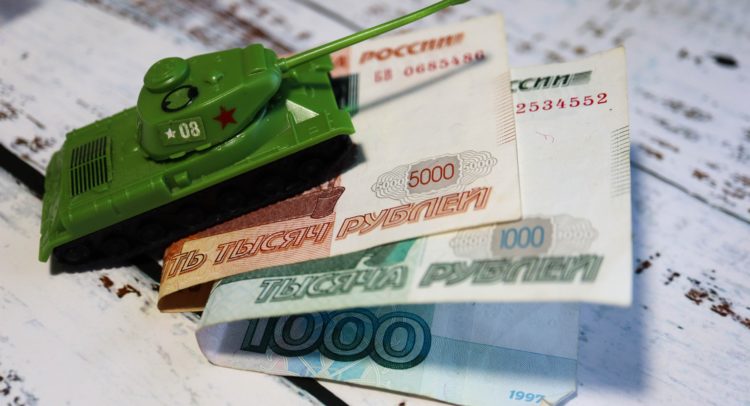As the war rages on between Ukraine and Russia, the economic fallout story appears to evolve with it. Initially, a spike in oil and natural gas prices bolstered concerns over rising inflation, which is set to affect society much more palpably, as nearly all segments of the supply chain will be affected. Many of these higher costs incurred by companies are anticipated to be passed on to consumers, who have already been feeling the pain at the pump, and beyond, over the last few months.
Moreover, harsh sanctions levied by the U.S. and EU member states are expected to cut parts of the Russian financial sector off from the SWIFT transfer system, and most recently, assets have been frozen for oligarchs, and foreign-currency reserves have been disrupted for the Russian central bank. As a consequence, the Russian ruble is falling hard against the U.S. dollar, as lenders lose faith in the value of the currency and the government that controls it.
In response to the tumbling ruble, the Moscow stock exchange was closed Monday and currency trading halted.
The Society for Worldwide Interbank Financial Telecommunication, or SWIFT, is paramount to banks globally in order for them to send and receive wire transfers. Several Russian banks were blocked from using it, joining a club inhabited by countries like Iran and North Korea.
This is all in an effort to increase pressure on Putin, as he continues his unprovoked assault on Ukraine’s government, resources, and civilians. Cutting off Russia from global trade and services will inevitably reduce the amount of money used to finance Putin’s war, and most likely cause his own people to feel a direct impact from the war despite its mental distance.
Already, large anti-war demonstrations have erupted throughout Europe and Russia, and these increasingly stringent sanctions are sure to keep those fueled up with angry protestors.
A recent report from BlackRock (BLK) on the macroeconomic situation anticipates a “protracted stand-off between Russia and the West,” which has already begun to materialize as Western nations arm and back Ukraine in a way not dissimilar to the proxy conflicts of the Cold War. The report also detailed that now, Russian airlines have been barred from the majority of European airspace, and further gates may go up against Russian technology exports.
In retaliation against the West, BlackRock expects an uptick in Russian cyberattacks, and elevated levels of misinformation spread across social media platforms. While the latter does not appear particularly threatening at first glance, this kind of weapon has the power to push democratic societies apart from one another. Through the constant consumption of social media, individuals can be led down misconstrued pathways through polarizing content produced by Russian troll farms.
Regarding domestic assets, the stock market has already experienced a wide-ranging sell-off of riskier and more speculative stocks, a trend that had already been well underway before the conflict began. Precious metals rose as investors fled to safer and less volatile assets, driven by fears of rising and runaway inflation in the U.S.
However, not all is doom and gloom for the foreseeable future. While the war remains uncertain and millions of Ukrainian lives will never be the same, talks between officials on either side are underway on the Belarusian border. U.S. stocks staged rebounds over the last couple of trading sessions, with many of the stock indices recouping losses from Wednesday and early Thursday trading.
Download the TipRanks mobile app now
To find good ideas for stocks trading at attractive valuations, visit TipRanks’ Best Stocks to Buy, a newly launched tool that unites all of TipRanks’ equity insights.
Read full Disclaimer & Disclosure

